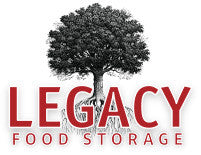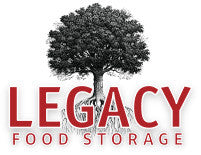
Emergency Reality Check: Planning for Unexpected Guests
A severe storm knocks out power in several cities including yours. Roads are blocked and stores are sold out of most everything. It’s been multiple days and there is still no update on when power will return. You are very relieved to have emergency supplies ready to last and keep your family comfortable until power is restored. Just as you're settling in for the evening, there is a knock on your door. Friends have shown up seeking your help. The real test of your emergency preparedness begins, how long can you last with the additional mouths to feed? How will you manage the supplies you planned for your family so everyone will have enough?
Most people build their emergency kits for their immediate household, but disasters can bring surprises, including unexpected visitors looking for assistance. Working some flexibility into your emergency plan is a good idea to help manage your stored resources and the additional mental stress that comes with this situation. A few additional mouths to feed might not seem like much, but if a disaster stretches over several days or weeks, supplies can dwindle quickly.
- Security Considerations
The key is balancing compassion with caution; being prepared to help trusted people while maintaining your family's safety. It’s hard to imagine, but during a crisis desperation can change people's behavior. Having clear security rules is very important.
- Have clear boundaries about who you'll accept (close family, immediate neighbors)
- Keep silent about your supplies to avoid attracting unwanted attention
- Install motion-sensor lights and basic door/window locks
- Create a check-in system (like a shared code word) for after dark
- Consider a designated "guest area" separate from your main supplies
- Keep valuables and main supply storage secure and out of sight
- Have a plan for politely but firmly turning away strangers
- Calculate and Manage Resources
- Basic Planning
- Add 25-50% extra capacity for unexpected guests
- Consider the possible addition of elderly neighbors, nearby family, or friends with children or pets
- Start with strict rationing from day one
- Keep an inventory of supplies and monitor usage
- Consider pooling resources with guests who bring supplies
- Plan meals that can easily scale up or down
- Extra Supplies on a Budget
- Bulk staples:Rice, beans, oats, and pasta provide high calories at a low cost
- Freeze-dried meals:Lightweight, long shelf life, and easy to prepare
- Shelf-stable proteins:Canned meats, peanut butter, nuts
- Comfort foods:Hard candies, chocolate, coffee, tea (morale boosters)
- Water and Utilities
- Water: 1 gallon per person per day minimum, plus extra for cooking and hygiene
- Water filtration: Extra filters or purification tablets
- Cooking: Extra portable stove, extra fuel
- Lighting: Extra flashlights, batteries, solar-powered options
- Hygiene: Toilet paper, soap, hand sanitizer, shampoo
- Bedding: Blankets, sleeping bags, inflatable mattresses
- Climate control: Battery-powered fans, hand warmers, extra clothing layers
- Health and Medical Supplies
- First aid supplies
- Extra OTC medications
- Consider any special needs (insulin storage, CPAP machines, etc.)
- Establish handwashing stations and protocols
- Plan for waste management with extra people
- Stock extra cleaning supplies and disinfectants
- Maintaining Morale
- Entertainment: Board games, cards, books, puzzle books
- Group activities: Storytelling sessions, skill-sharing conversations
- Exercise: Simple workouts, yoga, stretching, meditation
- Children's activities: Coloring books, quiet toys, games
- Managing Stress-Sharing your space during an emergency can strain everyone's mental health. Preparing for the emotional aspects is just as critical as building supplies.
- Communicate clearly about how things will be shared and rationed
- Keep routines where possible to ease anxiety
- Create a shared task list to foster teamwork
- Establish quiet hours for rest and personal space
- Plan exit strategies for when conditions improve, or worsen
Disasters have a way of bringing people together, whether we expect it or not. By including extra supplies in your preparedness plan and developing a strategy for managing both physical and emotional challenges, you can be ready to offer help without jeopardizing your household's safety or mental patience.
Take a moment to review your current emergency supplies. Could you handle a few unexpected guests? If not, consider adding some bulk items to your next shopping list. A little extra preparation today can make a huge difference in your ability to help those in need.
Tags
- All
- 25 year food
- 25 year shelf life food
- 72 hour kit
- Best food storage types
- Best long-term food storage
- Blizzard preparedness
- Budgeting
- canning
- Certified GMO-free Emergency foods
- Certified GMO-free foods
- Coffee
- Comparison of emergency food methods
- Composting tips
- Dangers of genetically modified foods
- dehydrated food
- Edible Wild Plants
- emergcy preparedness
- Emergency Cooking
- Emergency Food
- Emergency food Christmas gifts
- emergency food storage
- Emergency Food Supply
- Emergency food supply recommendations
- Emergency Planning
- Emergency Preparedness
- Emergency preparedness advice
- emergency preparednesss
- Emergency Supplies
- Emergency supplies checklist
- Emergency Survival
- emergency survival gear
- Emergency survival kit checklist
- Emergency Survival skills
- exercise
- Family emergency preparedness
- Family emergency preparedness plan
- Family Preparedness
- Food Storage
- Food storage 25 year shelf life
- Food storage amounts
- Food storage Christmas
- Food storage containers long term
- Food Storage Secrets
- Food storage serving size
- Food storage types compared
- freeze dried food
- Freeze dried food storage
- freeze dried meats
- Freeze-dried emergency food storage
- Fruit Trees
- Gardening
- Getting Started
- Gluten-free food Storage
- Gourmet emergency food
- Healthy food storage
- How much emergency food to store
- Improved emergency preparedness
- Jared Markin
- Jared Matkin
- Legacy Premium
- Lessons learned from Hurricane Sandy
- Lessons learned from natural disasters
- long-term food storage
- Long-term Food Storage Guidelines
- Long-term Food Storage tips
- Long-term water storage
- Mental Emergency Preparedness
- Mental toughness
- Money-saving tips
- Natural disaster planning
- Natural Disasters
- Perfect Christmas gifts
- Pet Emergency preparedness checklist
- Pet Emergency preparedness kit
- Pet Emergency Survival tips
- Pets and Emergency Preparedness
- Plant Foraging
- portable solar panels
- portable solar power
- portable water filters
- protein drinks
- Risk of genetic modification
- Seed saving and storage
- Seed saving guide
- Self-reliance
- Self-reliant practices
- Shelf Life
- Solar Cooking
- Solar Ovens
- Special Dietary needs
- Stranded in a car in a blizzard
- Survival food
- Survival Gear
- survival kit
- Survival kits
- Survival Ovens
- Survival Skills
- survivalist gear
- suvival kit
- Tree Pruning tips
- Tree Trimming basics
- unique ideas
- water bottle with filter
- water filter
- water filter straw
- water filters
- Water Filtration
- water pitcher with filter
- water pitchers with filters
- Water purification
- Wild Food Foraging
- Winter composting
- Winter driving
- Winter preparedness tips
- Winter storm preparedness tips
- Winter Survival







